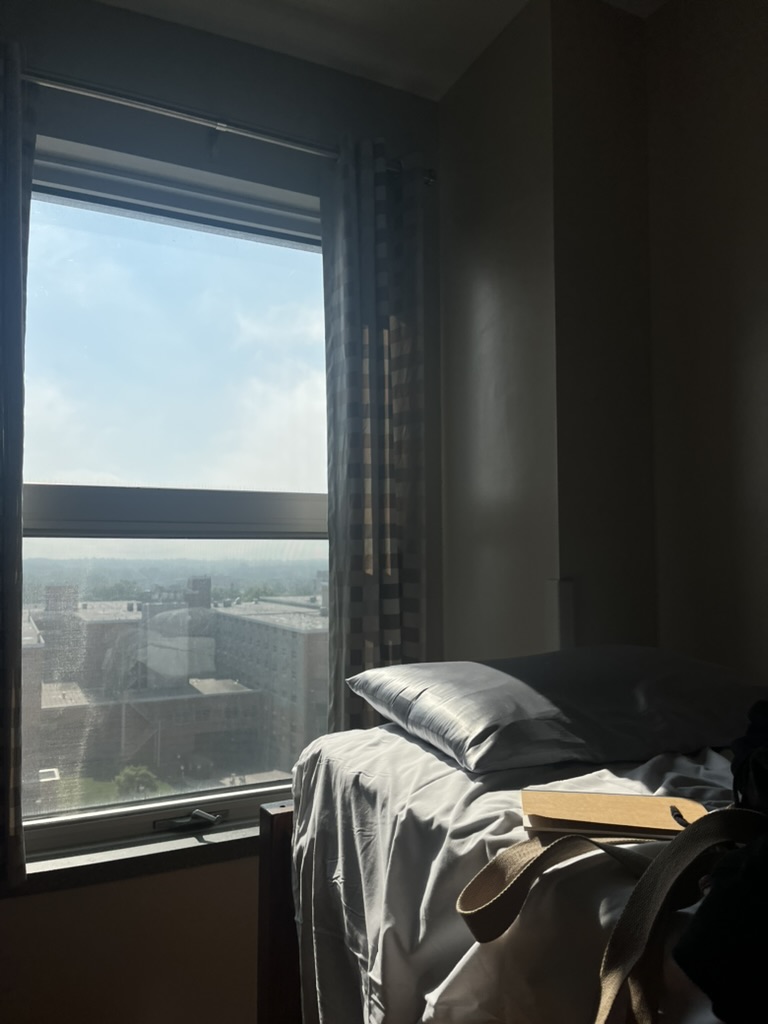Perspectives: Commuter vs. residential


A peaceful room greets me as I wake up in my own comfortable bed. Soft sunlight filters through my window as I step into my airy kitchen, where breakfast is exactly as I like it: crisp toast, my favorite brand of yogurt and fresh fruit I picked out myself at the grocery store. Outside, the morning air is refreshing and quiet, and my fifteen-minute walk to the lab feels more like a tranquil transition than a chore.
This was my daily morning routine in Boston this summer, built around the simple pleasure of living in my own apartment and commuting to work every day.
Living off campus offers something more valuable than a walk to work: the comforts of private home ownership. I had my own kitchen, dining table, bed and most importantly, bathroom. No unfamiliar hair clogging the drain, no need to ferry towels and toiletries back and forth like a nomad.
I could cook whatever I wanted, whenever I wanted, tailoring each meal exactly to my taste. There’s no shuffling through a dining-hall line, no large trays of lukewarm eggs or communal toasters with mysterious stains. Additionally, unlike some dorm arrangements that impose campus boundaries or curfews, I could step onto the subway or wander the city with freedom, visiting my favorite cafés at any hour without dealing with the hassle of signing out or asking permission.
Then there’s the roommate gamble. Living with someone can lead to a lifelong friendship, but only if you like them. If you’re unlucky, you’re stuck together for the entire summer, with no escape from constant irritation or awkward negotiations over thermostat settings and wakeup times. Commuting allows you to bypass the gamble entirely, ensuring a drama-free summer.
Even with a compatible roommate, sharing a small space limits your freedom. In my apartment, I could be both an early riser and stay up late, whereas in a dorm I would be spending the summer tiptoeing around someone else’s sleep schedule. I could set my own schedule, waking up for a late-night snack or an early-morning run as I wished, making as much noise as I wanted without worrying of waking anyone up.
While the flexibility of apartment living can be liberating, it also comes with the responsibility to pay rent, for meals, and in many cases, for transportation. However, many summer programs come with a high fixed price tag precisely because they cover housing and meals. Living independently provides the opportunity to make cost-effective living decisions while still ensuring personalized and enjoyable amenities.
Some may also complain about the loneliness of an empty apartment, preferring instead the comfort and community of a common room. However, I find that one of the greatest gifts of commuting is the natural separation between work and home life. Entering the lab every morning, I could focus entirely on my day’s work; once I left, I returned to a space where I could unwind without annoyances like running into people I disliked. Having peers constantly around in dorm life can create an “always on” feeling that leads to burnout and social exhaustion. My daily reset of stepping into my comfortable, empty apartment boosted my productivity and mental health throughout the summer.
Even now, back in California, I think fondly of those peaceful Boston mornings and evenings. For me, commuting isn’t just about getting to work. It’s about having the space, comfort and freedom to enjoy the summer on my own terms.

Sunday afternoon. As my parents drive up to the entrance of the Willard dorm hall at Northwestern, we pass by welcome signs and Residential Assistants. Inside, an RA leads us to the elevator, and we head up 4 floors. I unlock the dorm room with a scan of my keycard and spot a bed beside a desk on each side of the room. Within minutes, I open up my suitcase, fill my closet space with clothes, and line up stationary on my desk. As I finish unpacking, I hear chatter from the hallway. My roommate walks in and we introduce ourselves.
Living in a dorm opens up the opportunity to meet new people and make friends easily. Rooming with someone in the same college-credit course helped me adjust to the unfamiliar environment. Seeing her everyday also initiated conversation instead of the limited interaction with only classmates. In the kitchen and communal restroom, I was also able to talk more with newfound friends. We all lived on the same floor, so we saw each other often and were able to form a deeper connection.
Rooming away from home also allowed me to learn independence-based skills. Usually, I would rely on my parents to cook, but in the dorm, my roommate and I would prepare meals or, using Doordash, have some delivered to our building. We learned how to make smart decisions about spending money and go out wherever we wanted as long as we signed out. During the program, my friends and I also had the chance to go into the city, learning how to take the subway in the process.
The special part about dorming on campus, for me, is the feeling of home after being there for a few weeks. We discussed our lives at school and ranted about the pile of work each of us had, which helped foster warm feelings of connection between us. Knowing that we had similar problems to converse made us all more alike than before. The friends I made are who I miss now back in California.
For me, dorming isn’t about the unpleasant communal bathroom experiences or worrying about your relationship with your roommate. It’s about the community and how it was my home away from home for three weeks of the summer.



